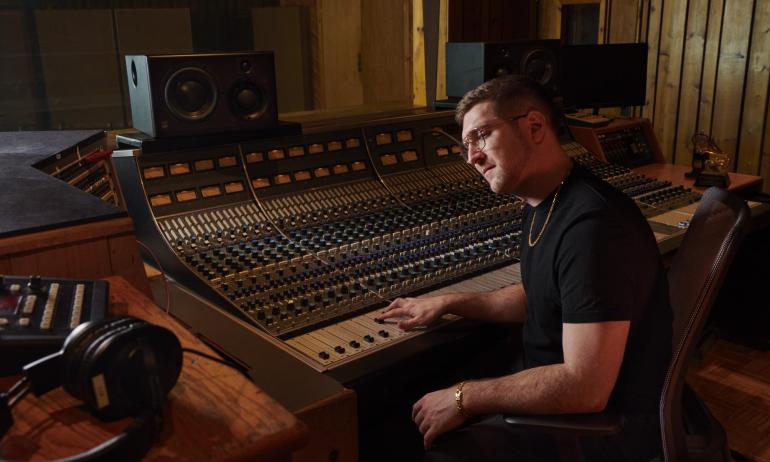Big Thief Returns to Its Roots

Big Thief (left to right): Buck Meek B.M. ’10, Adrianne Lenker B.M. ’12, James Krivchenia B.M. ’14, and Max Oleartchik
Image by Kelly Davidson
“This room used to feel bigger,” Adrianne Lenker B.M. ’12 said as she and her Big Thief bandmates took their seats for a live interview in a Berklee recital hall earlier this spring. “Everything did.”
This new sense of scale checks out. That same evening, Lenker, guitarist Buck Meek B.M. ’10, drummer James Krivchenia B.M. ’14, and bassist Max Oleartchik, would step onto another stage at Boston’s Roadrunner concert venue, where they would play to a sold-out crowd of 3,500. Over seven years and five albums—most recently this year’s sprawling success, Dragon New Warm Mountain I Believe in You—the band has amassed the sort of influence and acclaim that's fast approaching indie landmark status: Think of a band like their label-mates, the National. Think Arcade Fire. Think, if you're bold: Radiohead. If they haven’t quite reached that level of clout yet, give it a few years.
"There's always someone who shreds better. Always. You cannot be the best. But what you can be is you."
—
The conversation that afternoon, which was presented for a group of high school musicians and moderated by Berklee's dean of admissions, Damien Bracken, began at the very beginning, reflecting on the members' earliest musical influences—Meek, for example, "would play the broomstick along with Raffi VHSs"—and following their paths through Berklee. Lenker recounted the story, now legend, of tracking down Bracken and playing him her original songs to convince him that, despite the fact that she couldn't read music and didn't know any theory, she deserved a spot at the college. (Bracken, to his great credit, knew how to spot a generational talent even if she couldn't yet sight read.)
Throughout the interview, it was easy to see that these were musicians attuned to the mystical, tough-to-explain side of their craft, and accustomed to the art of jamming. They drew energy from each other's ideas, pulling out themes, and bridging the spaces between their individual experiences. What emerged over the course of that hour was a set of glorious, Big Thief–flavored riffs on many topics: origins, friendship, self-criticism, authenticity, sustainable success, vulnerability, and much more. What follows are some of the highlights from that conversation, edited for length and clarity.
On Berklee's Greatest Lessons
Before they ascended into the Pitchfork pantheon, most of the band members were right here, taking classes, jamming with new friends, and coping with the impostor syndrome that can take hold when you realize just how many good musicians a school like Berklee can gather in one place. Krivchenia remembered the experience of "a good, solid ego death" during his first year. "Coming here, you really realize you're not the most special musician ever," he said to the room of potential future Berklee students—not to be a downer, but to offer a different way of seeing things. "There's a lot of really special musicians," he said, adding that it took him a while to "shed that system of competition."
"There's always someone who shreds better. Always," said Oleartchik. "You cannot be the best. But what you can be is you."
These were insights the whole band cosigned, encouraging the audience to find the instructors and friends who recognize you for who you are and understand the sort of artist you want to become.
Meek: "It all starts with friendship...building an honest trusting friendship with someone and playing music from that place…. When I really look back at all the things that you could call 'achievements,' they all started with just a friendship.... Friendship is the most reliable way to build a career."
Listen to Buck Meek discuss his solo work, making the Big Thief album U.F.O.F., and meeting Joni Mitchell:
Lenker also spoke of learning "self-validation" through her time at Berklee:
Lenker: "There were so many opportunities to think that I was not good at music, or failing, or not shredding hard enough.... It gave me an opportunity to reaffirm my own sense and compass for what I think is cool and good.... It's music, so if it feels good in your guts, you're doing it fine, you're doing it right.
"These things [practice techniques, class content, etc...] are supposed to be mechanisms to get me closer to myself, and to expressing myself in a more fluid way. But if there's something that doesn't feel like it's resonating, or a way of learning that doesn't feel right, that's okay, because it's not about getting that thing right, it's about connecting to...your inner pulse.... The real gold that we have is those sparks of awareness and feeling and little curiosities that we get. That's the treasure."
On Big Thief’s Beginnings
After meeting as teenagers during a summer program at Berklee, Meek and Oleartchik fell out of touch. But when Meek, Lenker, and Oleartchik wound up in New York City, a chance encounter brought them back together. "I just decided to smoke a cigarette next to this tree," Oleartchik recalls, "and randomly—or maybe not randomly—I look to my left and Buck and Adrianne are walking towards me.... It had been 10 years. No text, no nothing...so it felt, like, from the stars." The band began in that moment, and it wouldn't take long before the current-day lineup solidified with the addition of Krivchenia on drums, who passed his "audition" without ever picking up a pair of sticks.
Lenker: "James came into the picture super organically.... [He] was engineering a project [Big Thief’s first album, Masterpiece], and we had a different drummer, and that drummer wasn't really working out, but James happened to be there and he was like, 'Just so you know, I would drop everything...'"
Meek: "We hired him without ever hearing him play the drums."
Lenker: "And mind you...what I love about this moment with James is, we weren't nothing..."
Krivchenia: "I was in bands that were more popular than Big Thief, for sure."
Lenker: "Way more. It had nothing to do with that, or some potential future of us being successful, or momentum we already had, because we had no momentum."
Krivchenia: "I just loved it. I saw the juice—that what people saw at your shows was just the tip of the iceberg of something really powerful."
On Guarding Their Artistry and Sustainable Success

Adrianne Lenker B.M. ’12
As Big Thief started seeing critical and commercial success, and as they began confronting the pressures and pitfalls that success can bring, the band worked hard to preserve their artistic integrity—both because they held this integrity as a core value, and because they knew this authenticity is what their audiences were connecting with. "All people want to see is you being yourself and making music from your heart," said Meek. "We've followed a philosophy [of]...just really making music for us, and never for the sake of business or what we think will be popular or what's gonna sell."
Krivchenia, who produced the band's latest album, amplified this point, explaining that their goal as they made the record was to focus solely on the artistry involved in that effort, "and then a bunch of business shit happens afterward...to reach people." The conversation continued from there:
Meek: "The music is the boss. The business would not exist without that music. You have to compartmentalize it, because you can't water it down in the creative process."
Krivchenia: "You have to protect it..."
Lenker: "For me, I've been working really hard to cultivate this idea of success [as] your relationship with yourself, with your friends, with your music, with your art being intact and as full as possible until the day you die—I feel really intense about this. I want to be making stuff and curious and digging into things and ripping things apart until I leave this earth.... I would prefer to be in a shack in the woods to being in a mansion on the hill having sacrificed bits of myself all along the way.
"[I]f everything was taken now—money, support, recognition—I feel like we would all still meet up [and] make music.... We have something no one can take away. If you have that, you have a lot of power."
—
"I think it's really hard.... Big Thief's a little bit of an anomaly in this way. I'm a little bit bewildered as to how we are where we are, in terms of: how the hell do we have any amount of recognition?" [Lenker acknowledged the band's hustle, and their hunger to tour and play shows and get their music out there, but says they never felt they had to compromise artistically through that grind.]
"I feel like I can speak for us all when I say that if everything was taken now—money, support, recognition—I feel like we would all still meet up, make music, make records, burn CDs if we have to.... We have something no one can take away.... If you have that, you have a lot of power..."
Meek: "When people do come to turn our music into a business, we've somehow managed to never compromise our value system and never sign a deal that felt icky for whatever reason—even though it's been really hard to navigate that, because there's so often a catch. There's so often a trick in the deal, one way or the other. But the four of us together have helped navigate that.... And it's scary whenever you turn something down. We've turned down a lot of money at times because something felt icky.... Over the years it's been proven to me that because we've never compromised that value system, the music has remained intact, which is why people keep coming and wanting to be a part of it."
On the Sound of 'Time Escaping'
Of all the strange and exhilarating sounds the band let loose on their new album, surely one of the most endearing oddballs is "Time Escaping"—a psychedelic swirl of prepared guitars and blown-out drums, shaded with synth tones and buoyed by Lenker's vivid, dreamy vocals. Because of the way the track was engineered by L.A. producer Sean Everett, this lush, otherworldly end result was something of a mystery to them even as they played through the song. "It sounds like more is going on than is," Lenker said. "In the room it sounded so dinky," Meek added, recalling the plinking sounds of their guitars, prepared with pieces of paper threaded through the strings. But, as the band explained, part of their approach to this new batch of songs was to place a great deal of trust in each of the four engineers they worked with, empowering them to make bold choices with the material.
Listen to "Time Escaping:"
Meek: "[Engineer Sean Everett] showed up to the session with this huge box full of contact microphones made out of plastic fruit and stethoscopes and tons of old pairs of headphones that he had modified with an XLR output to use as microphones. So he put hi-fi stuff on everything in the studio but also put a contact mic on every instrument.... The whole drum set had, like, headphones wrapped around the drums, and he put a pair of old headphones on Adrianne's guitar, on the lower bout, and on my guitar, and we had business cards in the strings to kind of deaden them. And he was just blowing all that contact mic stuff out through lots of guitar pedals..."
Krivchenia: "A lot of the credit for how that song sounds goes to Sean's engineering.... Basically, the way we functioned with all of the engineers was sort of to be like, 'Impress us.' It's really easy to have people engineer conservatively because they're not really sure what the band wants or they're feeling out how much power they have in their role..."
Lenker: "The main essence of why it sounds the way it does, is [that] there's so much playfulness and letting go...surrendering control. Like, engineer: you're an artist. Do your thing, go crazy. Just like, play, have fun, experiment, go wild. I want to be scared when I hear it."
Listen to Andrew Sarlo '11 talk about what it was like producing for a Big Thief record:
On Recording Their Vocals Live
The other production choice the band says helped make "Time Escaping" special was their preference for recording live, full-band takes for most of their songs—even for the main vocal track, and even when rerecording the vocals could yield a more conventionally "polished" final product.
Krivchenia: "We usually all play together, and Adrianne sings the lead vocal live—which, I highly recommend that method, because it saves you a lot of time and energy and frustration on knowing if you have something or you don't, and it sounds way better usually..."
Lenker: "That brings the magic, too, because if you can...just trust that you can play live or sing something live, I think it does take letting go.... It's never gonna sound as polished, but if you let go of the polished element of things, it opens up a lot."
Meek: "It sounds more real."
Lenker: "Yeah, the rawness, the real emotion coming through—it can be harder to see. Like, if I hear myself singing something that I don't like, I've really gotten to a place with it now where I just let them tell me. I'm just like, 'Do you guys think this is good?' And often times if I think it's bad, that's when they're like, 'No, that's the best part of the whole thing.'"
Meek: "It's not about it being good or bad, it's about: does it sound like you or not?"
Adrianne Lenker on Her Creative Process and Advice for Songwriters
At the heart of Big Thief's magic is Lenker's voice—the expressiveness of her singing and the poetic vulnerability of her songwriting. It makes sense, then, that as the hour came to a close, the conversation turned toward a question, asked by a high schooler in the audience, which is central to the band's resonance with their listeners: How does Lenker bring these songs out of such a raw emotional place?
Lenker: "The thing that's been the hardest for me...is where a lot of the songs come from is a place of pain, and a lot of why I developed songwriting at all from an early age was as a way of finding this balm, feeling like I had nowhere to turn for a multitude of reasons.... Yes, this is a passion, privilege, and honor to be able to do this, and a lot of people would look at the position we're in and be like, 'I want to be there,' or, 'That seems so great,' and in a lot of ways it really is, but then there's this whole other underworld to it.... The very thing that people are connecting to in my songs...[is] raw, tender, and extremely vulnerable.... And I know those words are really [over]used, and some people are off-put by the word 'vulnerability' or 'tenderness'...but that's the truth of it. I'm writing about stuff that, in the moments where I'm writing the songs, there's been times where I have felt like it's saved me, kept me alive, kept me going....
"Those types of songs, you have to really dig for them. Because it's not like every time I sit down to write a song, songs come out that I want to share with people. A lot of the stuff that I write I wouldn't want to share with people.... I think that it's like, rolling up your sleeves and just staying with it, being like, 'I'm gonna follow the thread through the dark caves and all the little pathways,' even if there's no gratification of getting a 'good song' out of it. And then going and sharing that with people and being sort of naked with it, it is terrifying in a lot of ways...especially when it's subject to criticism...
"I think the reason I've been able to maintain putting out music that still feels really raw and vulnerable to me is because I've somehow figured out a way to ignore all criticism, whether it be positive or negative—which is advice I think I might have heard from a quote of Nina Simone at some point while I was here [at Berklee].... No matter what you make, to have the courage to put it out in the world, it really helps to pay no mind to the outside voices.... If it's real to you, and if it feels like it's coming from the deepest place in you, that's usually what other people can connect to who need to. So that's my north star: this music isn't for people who don't connect to it. And it's fine if people don't like it. This music is for people who do connect to it and do find some value in it."




